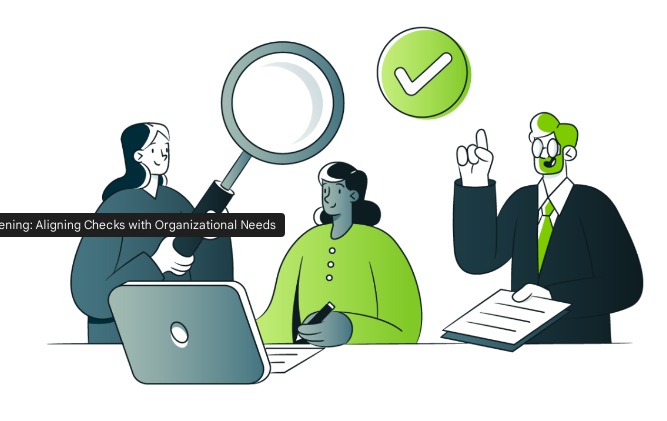Tech
The Evolving Landscape of Background Checks
Published
7 months agoon
By
Merry Nick
1. Avoiding Discrimination: The utilization of technology in background checks introduces the potential for biases, and ethical hiring necessitates a vigilant effort to prevent discrimination. Organizations must be diligent in their use of these tools, ensuring that the process remains impartial and unbiased, fostering equal opportunities for all candidates.
2. Ensuring Accuracy: The ethical dimension of hiring is intrinsically tied to the accuracy of the information gathered through background checks. Inaccurate data not only poses risks to candidates but also undermines the integrity of the entire hiring process. To address this, regular audits and verification processes become imperative, guaranteeing the reliability of the information obtained.
The integration of artificial intelligence and data analytics into background checks signifies a departure from traditional methods. While these technological advancements offer a more nuanced evaluation of a candidate’s history, it concurrently introduces ethical challenges that demand careful navigation.
As organizations embrace these tools, they must do so responsibly, cognizant of the potential biases that may arise. Ethical hiring practices call for a commitment to fairness, ensuring that technology serves as an aid in decision-making rather than a source of discrimination. This involves ongoing monitoring, refining algorithms, and adopting practices that prioritize equality.
Read Also: AppLooter.com
Furthermore, the accuracy of background check information becomes a linchpin in ethical hiring. Inaccurate data not only jeopardizes the reputation of candidates but can also lead to misguided decisions by employers. To mitigate this risk, organizations need to establish robust systems for auditing and verifying the information collected, maintaining a high standard of precision.
In conclusion, as technology propels background checks into a new era, the principles of ethical hiring become even more crucial. Striking the right balance between leveraging technological advancements and upholding fairness is essential for organizations committed to building diverse, inclusive, and ethically sound
Strategies for Ethical Implementation:
1. Customized Approach:
Tailor background checks based on the specific requirements of the role. This ensures a focused evaluation that aligns with the responsibilities of the position, avoiding unnecessary intrusion.
2. Clear Communication:
Communicate the scope and purpose of comprehensive checks transparently. Building trust with candidates and setting expectations regarding the evaluation process contributes to an ethical and positive hiring experience.
3. Continuous Policy Review:
Regularly review and update background check policies to ensure alignment with evolving legal standards and industry best practices. This proactive approach minimizes risks associated with outdated procedures.
Embracing Diversity and Inclusion:
1. Inclusive Screening Criteria:
Ethical background checks go hand in hand with fostering diversity and inclusion. Organizations must review and adapt screening criteria to embrace a broader range of experiences, recognizing that a diverse workforce brings unique perspectives and strengths.
2. Supporting Second Chances:
A key aspect of ethical hiring is recognizing the potential for personal and professional growth. Organizations committed to inclusivity consider candidates with past challenges, offering them a fair opportunity for rehabilitation and a fresh start.
Ethical Hiring in the Digital Age:
1. Cybersecurity Considerations:
In an era where data breaches are a significant concern, organizations conducting background checks must prioritize the cybersecurity of applicant data. Employing robust security measures safeguards both the candidates’ information and the integrity of the hiring process.
2. Educating Stakeholders:
Ethical hiring is a shared responsibility. Employers, HR professionals, and even candidates themselves must be educated on the ethical implications of background checks. This awareness fosters a collective commitment to fair and just hiring practices.
Conclusion: Navigating the Ethical Maze
Ethical hiring is not a static concept; it evolves with societal changes, technological advancements, and a deeper understanding of human potential. Organizations must continually reassess their approach to background checks, adapting to the shifting landscape while staying true to the principles of fairness, transparency, and respect.
As you navigate the importance of background checks and ethical hiring, remember that it’s not just about compliance; it’s about building a workplace that reflects your organization’s values. Embrace the challenges, strive for inclusivity, and consider the ethical implications of every step in the hiring process. In doing so, you not only attract top talent but also contribute to a culture of integrity and trust within your organization.
Striking the right balance between the importance of background checks and ethical hiring practices is not just a legal obligation but a strategic choice. Organizations that prioritize thorough yet respectful screening processes position themselves for sustainable success. As the employment landscape continues to evolve, ethical hiring practices become a defining factor in attracting and retaining top talent. Curious to delve deeper into the nuanced world of background checks and ethical hiring? This exploration is not just about compliance; it’s about building a workplace founded on trust and integrity.
You may like

Navigating Sri Lanka’s Visa Process: Understanding the Visa Eligibility Checker Tool

Understanding Sri Lankan Visa Requirements for French and Belgian Citizens

Navigating Sri Lankan Visa Requirements: A Guide for New Zealand Citizens and the Convenience of Online Applications

Exploring Sri Lanka: Visa Requirements for Danish and Canadian Citizens

Navigating Visa Requirements: Sri Lanka Transit Visa and Visa for Australian Citizens

How To Level Up Sign Language Competency

VIETNAM VISA ELIGIBILITY

Your Comprehensive Guide to Canada Tourist Visa

HOW TO GET CAMBODIA VISA FOR INDIAN CITIZENS

Indian Visa Application: A Step-by-Step Guide for Travelers

Navigating Sri Lanka’s Visa Process: Understanding the Visa Eligibility Checker Tool

Understanding Sri Lankan Visa Requirements for French and Belgian Citizens

Navigating Sri Lankan Visa Requirements: A Guide for New Zealand Citizens and the Convenience of Online Applications

Exploring Sri Lanka: Visa Requirements for Danish and Canadian Citizens

